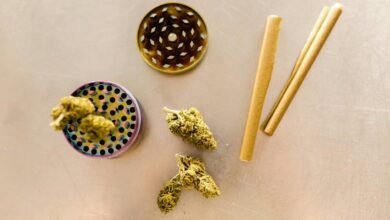Is Cbd and Thc the Same Thing

CBD and THC are distinct cannabinoids originating from the cannabis plant. CBD is known for its therapeutic benefits, including anxiety relief, while THC is recognized for its psychoactive effects. This differentiation plays a crucial role in their legal status and therapeutic uses. Understanding these nuances is vital for anyone interested in the implications of cannabis use. What factors contribute to their varying perceptions and applications in society?
Understanding CBD and THC: The Basics
Cannabinoids are a group of compounds found in the cannabis plant, with cannabidiol (CBD) and tetrahydrocannabinol (THC) being the most well-known.
CBD is celebrated for its potential health benefits, including anxiety reduction and pain relief, while THC is known for its psychoactive effects, often producing euphoria.
Understanding these compounds empowers individuals to make informed choices regarding their wellness and recreational use.
Key Differences Between CBD and THC
There are several key differences between CBD and THC that distinguish their effects and uses.
CBD offers various health benefits without inducing psychoactive effects, making it suitable for therapeutic applications.
In contrast, THC produces psychoactive effects, often associated with recreational use.
This fundamental distinction influences their legality, acceptance, and the contexts in which individuals may choose to utilize each compound.
Legal Status of CBD and THC
While the legal status of CBD and THC varies significantly across different jurisdictions, it largely hinges on their psychoactive properties and source.
CBD, often derived from hemp, is generally more accepted, while THC, a psychoactive compound from cannabis, faces stricter regulations.
Understanding the legal implications and regulatory frameworks surrounding these substances is crucial for individuals seeking to navigate their rights and responsibilities.
How CBD and THC Interact With the Endocannabinoid System
Understanding the legal distinctions between CBD and THC provides a foundation for exploring their biological effects, particularly in relation to the endocannabinoid system (ECS).
CBD interacts with endocannabinoid receptors to promote therapeutic effects without the psychoactive properties of THC. Conversely, THC activates these receptors, producing both therapeutic and intoxicating effects.
Together, they exemplify diverse pathways for wellness within the ECS.
Conclusion
In summary, CBD and THC are distinct cannabinoids with unique properties and effects. While CBD offers therapeutic benefits without intoxication, THC induces euphoria. Understanding these differences is crucial, especially for individuals seeking relief without the high. Imagine a world where one can enjoy pain relief akin to a soothing balm, while another experiences the euphoric lift of a sunny day; knowing which cannabinoid to choose can transform one's experience with cannabis, ensuring both safety and satisfaction.






